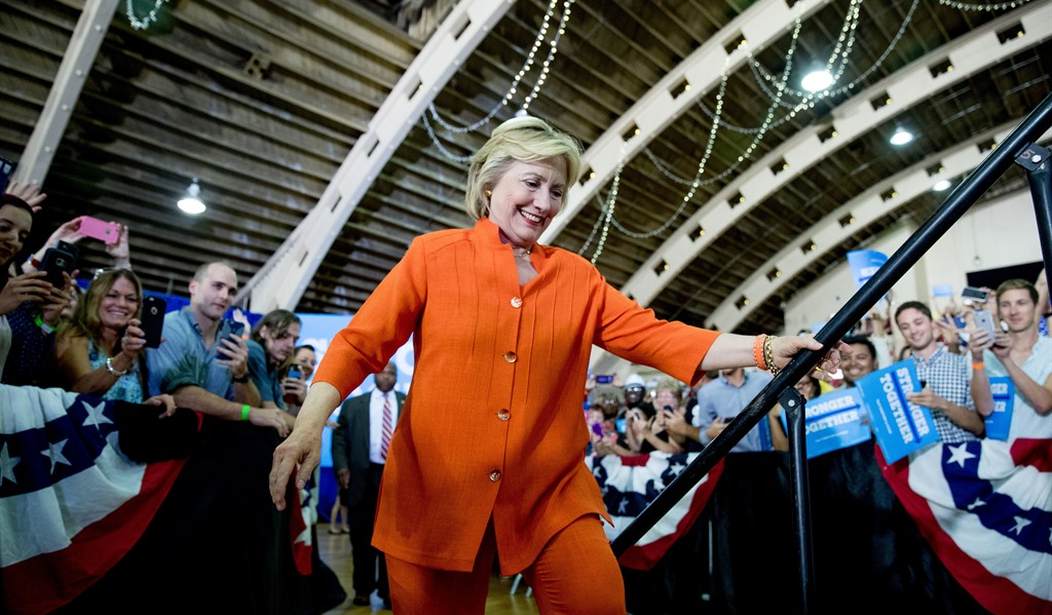The 2016 presidential race, in its current phase, more closely resembles a necktie party, with Donald Trump as the guest of honor, hands tied, sitting backward on a horse his foes of every possible persuasion can't wait to urge forward, leaving the Republican Party's chosen nominee twisting slowly, slowly in the wind.
We all know what the media think. On Monday, a former George W. Bush speechwriter, writing in The New York Times, urged vice presidential nominee Mike Pence to gee-up the horse in question and end the suspense about everything but the consequences of lynching a presidential nominee without the voters' consent.
Meanwhile, 50 ex-GOP national security officials, in a joint statement, declared Trump to be, potentially, "the most reckless president in American history" -- a man with little understanding of our country's "vital national interest, its complex diplomatic challenges," and so on and so on.
And that's just the Republicans!
Plainly, Trump himself, with top-of-the-head pronouncements better suited to Twitter than the Lincoln-Douglas debates, is the prime author of his own dilemmas. Moguls, like peons, should know when to keep their traps firmly shut. Yet this indisputable consideration by no means closes the matter, the heart of which is this:
Democracy requires a more-or-less responsible face-off between the principals in the perennial debate titled "Which Way for Our Country?"
Recommended
Contempt for, or blatant hatred of, Trump is not an automatic argument for electing our favorite woman of mystery, Hillary Rodham Clinton, to the head of affairs. The voting public deserves a chance to compare over a period of weeks -- and especially in the face-to-face combat we call debate -- the strengths and vulnerabilities of the contenders. So that the public may decide on its own, without undue help from the already committed, which candidate it regards as likelier to address our vast and serious problems.
Democratic theory, until we decide some day to heave it overboard in favor of Putin-ism or such like, demands that at the worst times -- maybe especially the worst times -- we take a look at all or both of the candidates on offer. And then decide. Decide on the basis of hearing and seeing and -- if we are up to the task -- listening and thinking.
It sounds hopelessly idealistic, until you consider the hazards involved, after all these years, in letting the media or the pulpit or business or labor or Hollywood or Facebook or Twitter do the picking. It's a Frank Capra-Norman Rockwell moment, if you please: free speech, free choice, in the face of daunting temptations to conformity.
Such is the theoretical component to the argument. Here is the practical side of things. If Trump, for whatever reason or combination of reasons, loses, Clinton wins. What would that mean? What liabilities, foreign or domestic, might a second Clinton administration accrue (especially one heavily influenced by the lefty duo of Elizabeth Warren and Bernie Sanders) -- and how should we weigh those liabilities against the ones a Trump administration might spread before us? What are the comparative risks? And how are we to reach a halfway-intelligent opinion so long as attention fixes on the noose that many are adjusting to Trump's neck dimensions? We need to think about it. We need to talk about it.
All of which I say with no whisper of admiration for Trump, or of delight in his candidacy, escaping my quavering lips. I have gone, in this race, from pro-Scott Walker, to pro-Jeb Bush, to pro-Marco Rubio, to Good-Lord-help-us.
We are where we are; it is what it is. And for it to get any better in this unpromising year, we the people require as intelligent and un-coerced a choice in November as can possibly be arranged.
We do not need, I might add, MSNBC and The New York Times presiding over the arrangements.

























Join the conversation as a VIP Member